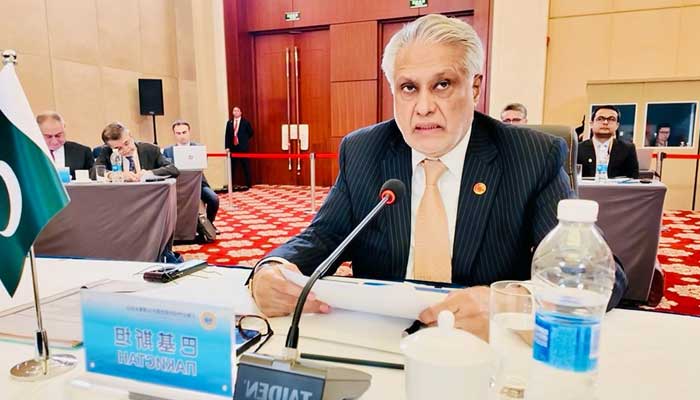SCO: How Pakistan prevailed over India
China wants to utilise rotating presidency to forge stronger solidarity, coordination, dynamism, productivity among SCO members
July 18, 2025

The Consul of Foreign Ministers meeting (CFM) of the Shanghai Cooperation Organisation (SCO) has yet again shown how Pakistan has diplomatically come to the centre stage and pushed India aside.
Moreover, under the leadership of Deputy Prime Minister and Foreign Minister Ishaq Dar, Pakistan has also used the moot to its full advantage by exposing the heinous face of India. Islamabad meticulously highlighted how Delhi waged war against Pakistan over Pahalgam, and that too without a credible investigation and verifiable evidence.
For Delhi, it was a double disaster as Indian External Affairs Minister S Jaishankar failed to persuade China to issue a joint declaration condemning the Pahalgam incident. As a matter of fact, his efforts to claim that the incident was aimed at sowing ‘a religious divide’ and hurt the economy of Jammu and Kashmir, were ignored.
On the other hand, Ishaq Dar pleaded Pakistan’s case with a carefully crafted speech and convinced the members how it has successfully averted a major war.
‘’It is most unfortunate that the attribution of the Pahalgam attack to Pakistan without a credible investigation or verifiable evidence brought the two nuclear-armed states to the brink of a major conflict. In a wake of mounting tensions, Pakistan's restrained and responsible approach was met with legal transgressions, rhetorical belligerence and strategic recklessness,’’ Dar remarked.
The deputy premier could humiliate India by mentioning how Pakistan turned its military adventure into a disaster by shooting down six fighter jets. However, Dar opted for a measured tone against the adversary sitting across the table.
‘’Pakistan remains steadfast in its commitment to the ceasefire and the cultivation of a stable regional equilibrium. However, we cannot accept that the arbitrary use of force is normalised. We believe that disputes and differences are resolved through dialogue and diplomacy instead of conflict and coercion,’’ Dar declared.
The foreign minister made it known to India that Pakistan would never tolerate hegemonic insanity and reminded Delhi of its bilateral responsibilities to abide by the 1960 Indus Water Treaty, stalled by Delhi after the Pahalgam incident.
Dar said, ‘’Strict adherence to the bilateral agreements would be equally important in this regard. Excellencies, the events unfolding since 22nd of April 2025 also reaffirm a central truth of South Asian geopolitics. The peaceful settlement of the long-standing unresolved dispute is imperative for an enduring peace in the region.’’
Deputy PM Dar, who had a bilateral meeting with his Chinese counterpart and also called on President Xi during his visit, lauded the SCO for emerging as a stabilising force.
‘’Its [SCO’s] inclusive approach, underscoring the sovereignty, equality of states and seeking peaceful resolutions of disputes, offers a compelling alternative to aggression, confrontation and zero rivalries.... Together, let us chart a course towards a future defined not by confrontation but by cooperation,’’ Dar concluded.
The SCO was founded on June 15, 2001, by China, Russia, Kazakhstan, Kyrgyzstan, Tajikistan and Uzbekistan. It aimed at combating terrorism, separatism and extremism. India and Pakistan joined this organisation on June 9, 2017. However, experts believe that Delhi is bent upon encouraging these evils in both Khyber Pakhtunkhwa (KP) and Balochistan.
Yet, during the meeting, Delhi agreed to fight against these three evil forces and peacefully resolve hotspot issues through dialogue and negotiation.
Proposing a five-point peace and developmental plan, Chinese Foreign Minister Wang Yi stressed good neighbourliness and carrying forward the “Shanghai Spirit”.
He said, “Regional conflicts are emerging one after another. Under the new situation, member states should form a further consensus on strengthening the construction of the SCO in a responsible attitude towards history and the future”
Experts say that India’s responsible attitude towards history can be easily judged by how it honours the 1960 Indus Water Treaty and United Nations Security Council Resolutions on Kashmir.
The SCO summit is scheduled for August 31-September 1. It will be held in the same city, Tianjin, where leaders from more than 20 countries and heads of almost a dozen international organisations will gather for a historic moment.
China wants to utilise its rotating presidency to forge stronger solidarity, coordination, dynamism and productivity among SCO members. The architect of the Belt and Road Initiative is also seeking a ‘new stage of high-quality development’ of this region.
Experts say that this dream can be achieved sooner rather than later if India lets ‘Shanghai Spirit’ tame its hegemonic designs in the region.
The author is Controller News at Geo News. He posts on X at @NasimHaider2 and can be reached at [email protected]











